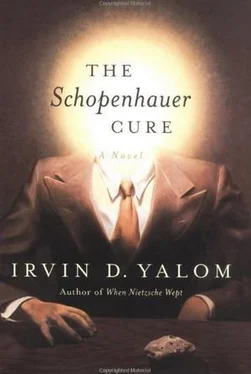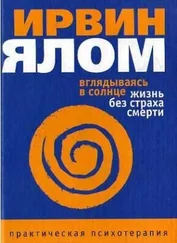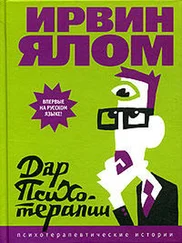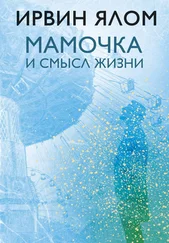Ирвин Ялом - The Schopenhauer Cure
Здесь есть возможность читать онлайн «Ирвин Ялом - The Schopenhauer Cure» весь текст электронной книги совершенно бесплатно (целиком полную версию без сокращений). В некоторых случаях можно слушать аудио, скачать через торрент в формате fb2 и присутствует краткое содержание. Жанр: Психология, на русском языке. Описание произведения, (предисловие) а так же отзывы посетителей доступны на портале библиотеки ЛибКат.
- Название:The Schopenhauer Cure
- Автор:
- Жанр:
- Год:неизвестен
- ISBN:нет данных
- Рейтинг книги:5 / 5. Голосов: 1
-
Избранное:Добавить в избранное
- Отзывы:
-
Ваша оценка:
- 100
- 1
- 2
- 3
- 4
- 5
The Schopenhauer Cure: краткое содержание, описание и аннотация
Предлагаем к чтению аннотацию, описание, краткое содержание или предисловие (зависит от того, что написал сам автор книги «The Schopenhauer Cure»). Если вы не нашли необходимую информацию о книге — напишите в комментариях, мы постараемся отыскать её.
The Schopenhauer Cure — читать онлайн бесплатно полную книгу (весь текст) целиком
Ниже представлен текст книги, разбитый по страницам. Система сохранения места последней прочитанной страницы, позволяет с удобством читать онлайн бесплатно книгу «The Schopenhauer Cure», без необходимости каждый раз заново искать на чём Вы остановились. Поставьте закладку, и сможете в любой момент перейти на страницу, на которой закончили чтение.
Интервал:
Закладка:
real danger here is more distant spread, but we won`t know that till the CT scan which
I`ve arranged for tomorrow at eight.»
Two days later they continued their discussion. Bob reported that the CT scan was
negative—no evidence of spread elsewhere in the body. That was the first good news.
«But even so, Julius, this adds up to a dangerous melanoma.»
«How dangerous?» Julius`s voice cracked. «What are we talking about? What kind
of survival rate?»
«You know we can only address that question in terms of statistics. Everyone is
different. But for an ulcerated melanoma, four millimeters deep, with five nodes, the
statistical charts show a five–year survival of less than twenty–five percent.»
Julius sat for several moments with head bowed, heart pounding, tears in his eyes,
before asking, «Keep going. You`re being straight. I need to know what to tell my
patients. What will my course be like? What`s going to happen?»
«It`s impossible to be precise because nothing more will happen to you until the
melanoma recurs somewhere in the body. When it does, especially if it metastasizes, then
the course might be quick, perhaps weeks or months. As for your patients, hard to say,
but it would not be unreasonable to hope for at least a year of good health ahead of you.»
Julius nodded slowly, head down.
«Where`s your family, Julius? Shouldn`t you have brought someone in with you?»
«I think you know about my wife`s death ten years ago. My son is on the East
Coast and my daughter in Santa Barbara. I`ve said nothing to them yet; I didn`t see any
sense in disrupting their lives unnecessarily. I generally do better licking my wounds in
private anyway, but I`m pretty sure that my daughter will come up immediately.»
«Julius, I`m so sorry to have to tell you all this. Let me end with a little good news.
There`s a lot of energetic research going on now—perhaps a dozen very active labs in
this country and abroad. For unknown reasons the incidence of melanoma has risen,
almost doubled in the last ten years, and it`s a hot research area. It`s possible that
breakthroughs are close at hand.»
For the next week Julius lived in a daze. Evelyn, his daughter, a classics professor,
canceled her classes and drove up immediately to spend several days with him. He spoke
at length to her, his son, his sister and brother, and to intimate friends. He often woke in
terror at 3A.M. , crying out, and gasping for air. He canceled his hours with his individual
patients and with his therapy group for two weeks and spent hours pondering what and
how to tell them.
The mirror told him he didn`t look like a man who had reached the end of his life.
His three–mile daily jog had kept his body young and wiry, without an ounce of fat.
Around his eyes and mouth, a few wrinkles. Not many—his father had died with none at
all. He had green eyes; Julius had always been proud of that. Strong and sincere eyes.
Eyes that could be trusted, eyes that could hold anyone`s gaze. Young eyes, the eyes of
the sixteen–year–old Julius. The dying man and the sixteen–year–old gazed at each other
across the decades.
He looked at his lips. Full, friendly lips. Lips that, even now in his time of despair,
were on the edge of a warm grin. He had a full head of unruly black curly hair, graying
only in his sideburns. When he was a teenager in the Bronx, the old white–haired, red–faced, anti–Semitic barber, whose tiny shop was down his street between Meyer`s candy
store and Morris`s butcher shop, cursed his tough hair as he tugged at it with a steel comb
and cut it with thinning shears. And now Meyer, Morris, and the barber were all dead,
and little sixteen–year–old Julius was on death`s call sheet.
One afternoon he tried to attain some sense of mastery by reading the melanoma
literature in the medical school library, but that proved futile. Worse than futile—it made
things more horrendous. As Julius apprehended the truly ghastly nature of his disease, he
began to think of melanoma as a voracious creature sinking ebony tendrils deep into his
flesh. How startling it was to realize that suddenly he was no longer the supreme life
form. Instead he was a host; he was nourishment, food for a fitter organism whose
gobbling cells divided at a dizzying pace, an organism that blitzkrieged and annexed
adjacent protoplasm and was now undoubtedly outfitting clusters of cells for cruises into
the bloodstream and colonization of distant organs, perhaps the sweet friable feeding
grounds of his liver or the spongy grassy meadows of his lungs.
Julius put aside the reading. Over a week had gone by, and it was time to move
past distraction. The hour had come to face what was really happening. Sit down, Julius,
he told himself. Sit down and meditate upon dying. He closed his eyes.
So death, he thought, has finally made its appearance on stage. But what a banal
entrance—the curtains jerked open by a roly–poly dermatologist with a cucumber nose,
magnifying glass in hand, and costumed in white hospital coat with his name stitched in
dark blue letters upon his upper breast pocket.
And the closing scene? Destined, most likely, to be equally banal. His costume
would be his wrinkled pinstriped New York Yankees night–shirt with DiMaggio`s
number 5 on the back. The stage set? The same queen–sized bed in which he had slept for
thirty years, crumpled clothes on the chair beside the bed and, upon his bedside table, a
stack of unread novels unaware that their time would now never come. A whim–pering,
disappointing finale. Surely, Julius thought, the glorious adventure of his life deserved
something more...more...more what?
A scene he had witnessed a few months ago on a Hawaiian vacation came to mind.
While hiking he had quite by chance come upon a large Buddhist retreat center and saw a
young woman walking though a circular labyrinth, constructed of small lava stones.
Reaching the center of the labyrinth she stopped and remained motionless in a lengthy
standing meditation. Julius`s knee–jerk reaction to such religious ritual was not charitable,
generally falling somewhere in the territory between ridicule and revulsion.
But, now, as he thought about that meditating young woman, he experienced softer
feelings—a flood of compassion for her and for all his fellow humans who are victims of
that freakish twist of evolution that grants self–awareness but not the requisite
psychological equipment to deal with the pain of transient existence. And so throughout
the years, the centuries, the millennia, we have relentlessly constructed makeshift denials
of finiteness. Would we, would any of us, ever be done with our search for a higher
power with whom we can merge and exist forever, for God–given instruction manuals,
for some sign of a larger established design, for ritual and ceremony?
And yet, considering his name on death`s roster, Julius wondered whether a little
ceremony might not be such a bad thing. He jerked away from his own thought as if
scorched—so thoroughly dissonant was it with his lifelong antagonism to ritual. He had
always despised the tools by which religions strip their followers of reason and freedom:
the ceremonial robes, incense, holy books, mesmerizing Gregorian chants, prayer wheels,
prayer rugs, shawls and skullcaps, bishop`s miters and crosiers, holy wafers and wines,
last rites, heads bobbing and bodies swaying to ancient chants—all of which he
Читать дальшеИнтервал:
Закладка:
Похожие книги на «The Schopenhauer Cure»
Представляем Вашему вниманию похожие книги на «The Schopenhauer Cure» списком для выбора. Мы отобрали схожую по названию и смыслу литературу в надежде предоставить читателям больше вариантов отыскать новые, интересные, ещё непрочитанные произведения.
Обсуждение, отзывы о книге «The Schopenhauer Cure» и просто собственные мнения читателей. Оставьте ваши комментарии, напишите, что Вы думаете о произведении, его смысле или главных героях. Укажите что конкретно понравилось, а что нет, и почему Вы так считаете.








![Ирвин Ялом - Проблема Спинозы [litres]](/books/396345/irvin-yalom-problema-spinozy-litres-thumb.webp)

